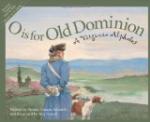As the little skiff moved out upon the river, a carriage rattled across the bridge. Sightseers who had driven over from Williamsburg were returning. However satisfied they may have felt with their short visit, we could only pity them. Yet such a visit, of a few hours at most, is all that is possible here except for one who brings his home with him, for there is no public house on the island. Stepping aboard Gadabout, we congratulated ourselves that she enabled us to live indefinitely right in the suburbs of old James Towne.
However, as days went on, Lady Fairweather became somewhat daunted by the dire predictions of chills and fever as a result of our long lying in the marshes; and one day she deserted the ship and sailed away on a bigger one. We thought she was to be gone only a little while, but she proved a real deserter and Gadabout saw no more of her to the end of the cruise.
But chills and fever never came to Gadabout’s household, though the dog-day sun beat upon the waste of reeds and rushes about us and though striped-legged mosquitoes were our nearest and most attentive neighbours. Fortunately, the mosquitoes did not feel that hospitality required them to call upon the strangers or to show them any attention except in the evening. Even then they were more or less distant, rarely coming into the houseboat, but lingering in a neighbourly way about doors and windows, and whispering assurances of their regard through some crossed wires that we happened to have there.
One of the chief causes of illness among the colonists, impure water, we did not have to contend with. In the early days of James Towne, the river was the only water supply; later, shallow wells were dug; both the river and the wells furnished impure, brackish water. To-day, two artesian wells are flowing on the island. As we got our supply from them, we often thought of how those first settlers suffered and died for want of pure water, when all the while this inexhaustible supply lay imprisoned beneath their cornfields. But even the water from the artesian wells we took the precaution to boil. So, pitting screens against mosquitoes and the teakettle against water germs, we lived on, chill-less and fever-less in the marshes of Back River.
CHAPTER VII
SEEING WHERE THINGS HAPPENED
We were fortunate in visiting Jamestown Island after considerable had been accomplished in the way of lessening the number of its historic sites. For a long while, almost every important event in its story had occurred at so many different places that it was scarcely possible for the pilgrim to do justice to them all.
But, some time before our visit to the island, an era of scientific investigation set in; researches were made among old musty records; and even the soil was turned up in order to determine the place where this or that event really did happen. The reduction in the number of places of interest was astonishing. In every instance, it was found that the historic event in question had happened at but a single place; and consequently all its other time-honoured sites suddenly became unhistoric soil.




